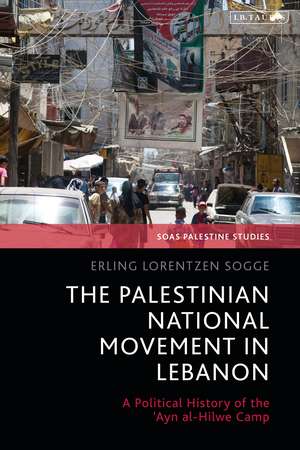The Palestinian National Movement in Lebanon: A Political History of the 'Ayn al-Hilwe Camp: SOAS Palestine Studies
Autor Erling Lorentzen Soggeen Limba Engleză Paperback – 28 dec 2022
| Toate formatele și edițiile | Preț | Express |
|---|---|---|
| Paperback (1) | 192.19 lei 6-8 săpt. | |
| Bloomsbury Publishing – 28 dec 2022 | 192.19 lei 6-8 săpt. | |
| Hardback (1) | 569.76 lei 6-8 săpt. | |
| Bloomsbury Publishing – 16 iun 2021 | 569.76 lei 6-8 săpt. |
Din seria SOAS Palestine Studies
- 31%
 Preț: 772.58 lei
Preț: 772.58 lei - 23%
 Preț: 192.19 lei
Preț: 192.19 lei - 23%
 Preț: 192.82 lei
Preț: 192.82 lei - 30%
 Preț: 511.40 lei
Preț: 511.40 lei - 30%
 Preț: 775.43 lei
Preț: 775.43 lei - 19%
 Preț: 198.68 lei
Preț: 198.68 lei - 23%
 Preț: 191.85 lei
Preț: 191.85 lei - 21%
 Preț: 217.09 lei
Preț: 217.09 lei - 21%
 Preț: 217.62 lei
Preț: 217.62 lei - 22%
 Preț: 225.67 lei
Preț: 225.67 lei - 13%
 Preț: 174.95 lei
Preț: 174.95 lei - 24%
 Preț: 190.16 lei
Preț: 190.16 lei - 23%
 Preț: 190.96 lei
Preț: 190.96 lei - 30%
 Preț: 599.57 lei
Preț: 599.57 lei - 30%
 Preț: 509.86 lei
Preț: 509.86 lei
Preț: 192.19 lei
Preț vechi: 249.82 lei
-23% Nou
Puncte Express: 288
Preț estimativ în valută:
36.77€ • 38.60$ • 30.52£
36.77€ • 38.60$ • 30.52£
Carte tipărită la comandă
Livrare economică 11-25 aprilie
Preluare comenzi: 021 569.72.76
Specificații
ISBN-13: 9780755642342
ISBN-10: 0755642341
Pagini: 272
Ilustrații: 6 bw illus
Dimensiuni: 156 x 234 x 25 mm
Greutate: 0.38 kg
Editura: Bloomsbury Publishing
Colecția I.B.Tauris
Seria SOAS Palestine Studies
Locul publicării:London, United Kingdom
ISBN-10: 0755642341
Pagini: 272
Ilustrații: 6 bw illus
Dimensiuni: 156 x 234 x 25 mm
Greutate: 0.38 kg
Editura: Bloomsbury Publishing
Colecția I.B.Tauris
Seria SOAS Palestine Studies
Locul publicării:London, United Kingdom
Caracteristici
Bridges the gap between anthropology and history by bringing individual agency into conversation with the global politics of Palestinian life and Islamist movements
Notă biografică
Erling Lorentzen Sogge is a postdoctoral researcher at the University of Oslo, Norway where he was also awarded his PhD in Middle East Studies. He has also been a research fellow at the Department of Political Studies and Public Administration at the American University of Beirut, Lebanon. He has published in the journal "Middle East Research and Information Project" (MERIP) and also "Babylon - Nordic Journal of Middle East Studies", of which he was Editor-in-Chief.
Cuprins
List of IllustrationsAcknowledgements Note on Transliteration1. 'Ayn Al-Hilwe and the National Movement2. The Anatomy of a Palestinian State in Exile3. The PLO's Return to Lebanon4. 'Ayn Al-Hilewe's Islamic Forces5. Armies of Outlaws, Sons of the Camp 6. Forming a Palestinian Police Force in Exile7. Protest Movements and Voices of Dissent 8. Conclusion Overview of the Palestinian Factions in Lebanon Bibliography
Recenzii
This is a well-conceived, ethnographically rich, and remarkably detailed account of a Palestinian refugee camp's dynamic and ever-shifting political history with a focus on the emergence of Islamists politics. Sogge's book is a welcome contribution to the growing corpus of studies of refugee camps and political movements. This finely grained study provides a solid example of the contexts in which Islamist movements take root. The author astutely captures the enmeshment of the camp, and Palestinian refugees, in local and regional political issues. Most significantly, this study adds to the literature illuminating that refugees may be without rights, but they are hardly without the agency to shape their worlds.
The tangled politics of the Palestinian national movement in Lebanon are nowhere more complex than in 'Ayn al-Hilwe refugee camp. Erling Sogge does a masterful job of untangling these, moving beyond stereotypes to paint a rich and nuanced portrait of the forces at play, the actors involved, and the local society in which they are embedded. His book illuminates important dimensions of Palestinian and Lebanese politics alike, and also makes an important contribution to our understanding of refugee politics more broadly. I strongly recommend it.
The tangled politics of the Palestinian national movement in Lebanon are nowhere more complex than in 'Ayn al-Hilwe refugee camp. Erling Sogge does a masterful job of untangling these, moving beyond stereotypes to paint a rich and nuanced portrait of the forces at play, the actors involved, and the local society in which they are embedded. His book illuminates important dimensions of Palestinian and Lebanese politics alike, and also makes an important contribution to our understanding of refugee politics more broadly. I strongly recommend it.
